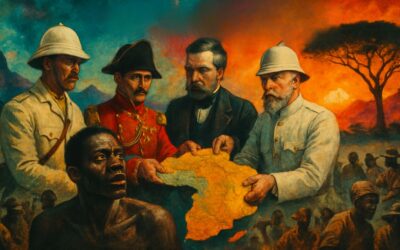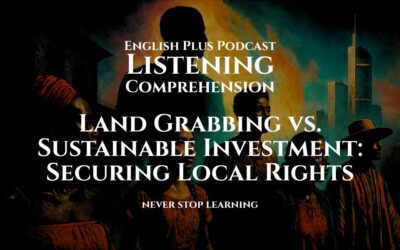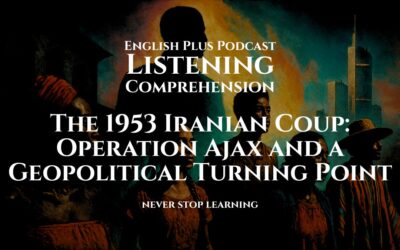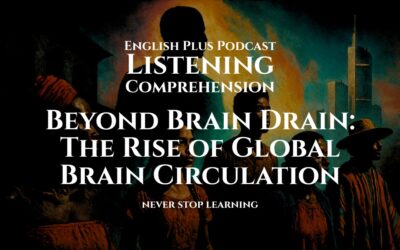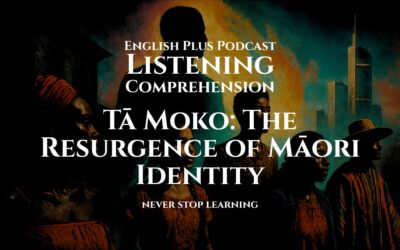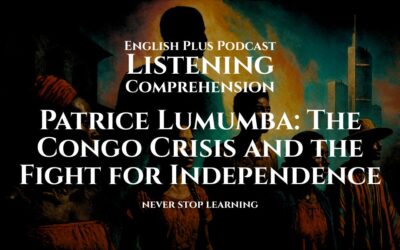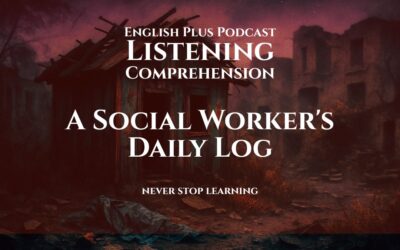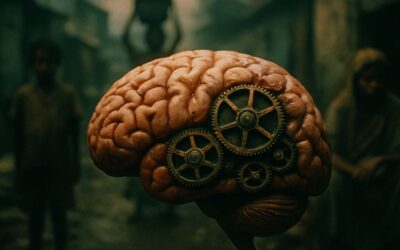English Plus Magazine
Dive into a world of ideas, stories, English and discovery.
Letter from the Editor

The End of the “Free-for-All”: Why English Plus is Pivoting to a Premium Future
After eight years of giving it all away, the internet has changed. To survive the noise of the AI era and build something truly lasting, English Plus must evolve from a public broadcast into an exclusive community.
For nearly eight years, since I left traditional employment, my mission has been simple: provide high-quality English education, compelling stories, and original music to anyone with an internet connection, completely free of charge.
I believed in the old contract of the internet: build value, build an audience, and support will naturally follow. For a long time, that model worked.
But the internet of 2026 is not the internet of 2018.
Today, the digital landscape is flooded. Algorithms prioritize quantity over quality. AI-generated “content farms” churn out mediocre articles and generic music at a scale no human can compete with. The public square has become deafeningly noisy.
For an independent creator dedicated to nuance, depth, and genuine artistry, fighting for attention in this environment is a losing battle. It is also an exhausting one. Trying to maintain a massive volume of free content just to stay visible has led to burnout, and frankly, it is no longer a sustainable way to support my family.
I have realized that by trying to serve everyone for free, I am serving no one perfectly, and very soon, no one at all.
Therefore, I have made a difficult but necessary decision. English Plus is ceasing its “volume game.” I am done chasing the algorithm. Instead, I am pivoting entirely to focusing on value for the people who value my work.
Effective immediately, English Plus is transforming into a primarily premium, member-supported ecosystem.
The New Reality: Less Noise, More Depth
This isn’t about disappearing; it’s about refocusing. Here is exactly how the platform is changing for the general public versus our Patreon members:
1. The Website: The 80/20 Shift
For eight years, I have published thousands of articles. That vast archive will remain free as a public resource. However, moving forward, 80% of new content on the website will be locked exclusively for our members.
- The Public: Will receive one high-quality article per week.
- The Members ($5 Tier): Will receive six or more additional deep-dive articles, advanced language analyses, and exclusive literary explorations every week.
2. The Podcast: From Broadcast to Masterclass
We are drastically reducing the public podcast output to focus on depth.
- The Public: Will receive one standard episode per week.
- The Members ($5 Tier): Will receive an additional, longer, more intensive “masterclass” episode every week, tackling complex topics we can’t cover in the free feed.
3. The Music: The “Virtual Concert” Hall
As a composer, it is disheartening to see human-created music swallowed whole by streaming platforms incentivizing AI generation. I am removing my focus from public streaming.
- The Radio Station: The 24/7 internet radio station is being shut down immediately.
- Exclusive Drops: My new albums, intricate mixes, and musical experiments will no longer be released to the general public. They will be released solely as “Virtual Concerts” and exclusive digital drops for my $10 Tier patrons.
The Bigger Picture: The Educational Game Project
Stepping back from the relentless churn of producing free daily content is not just about survival; it is about freeing up mental energy for innovation.
This pivot buys me the time required to focus on my most ambitious goal yet: The English Plus Educational Game Project.
My goal is to move beyond passive listening and reading to create interactive experiences that make learning addictive. By supporting English Plus now, you aren’t just paying for articles; you are funding the development of these games. Furthermore, my patrons will be the exclusive beta testers, getting to play and shape these projects before the rest of the world even sees them.
A Final Note on Value
I want to take a moment to acknowledge the incredible Sponsors on Patreon (our $15 to $100 tiers). Their names are listed on every page of this site, in my books, and in my music credits because they are the executive producers of everything you see here. Their support is the bedrock that allows me to make this transition towards quality.
If you have been a long-time free listener or reader, I hope you understand this decision. Eight years is a long time to provide a professional service for free. If you value the expertise, the storytelling, and the music that English Plus provides, I invite you to join us on the other side of the paywall.
The free-for-all is over. The era of exclusive, high-value, human-created education has begun.
Danny Ballan
Founder, English Plus Podcast
English Plus Magazine
Check-Box Charity vs. Effective Altruism: How to Make Your Donation Count
Are you suffering from “check-box charity”? Discover the philosophy of Effective Altruism and learn how to move beyond temporary relief to fund systemic change. Stop buying guilt-relief and start investing in impact.
The Universal Flame: The History and Psychology of Winter Lights (From Yule to Hanukkah)
Why do we light candles in winter? Explore the anthropology of the Advent candle, Menorah, Diya, and Yule log. Discover the shared human history of combating darkness with light.
Beyond the Scramble: Overcoming Artificial Borders Through 21st-Century Cooperation
The “Scramble for Africa” & Sykes-Picot created borders that sparked conflict. This article pivots to the solutions: cross-border economic zones, the AU, and cultural festivals that are making those lines irrelevant.
The Missing Pieces: How Cultural Repatriation Is Building a New Future
Move beyond the “stolen art” debate. Discover how cultural repatriation is not an end, but a beginning for healing cultural trauma, building mutual respect, and forging new, equitable global partnerships.
Land Grabbing vs. Sustainable Investment: Securing Local Rights | Listening Comprehension
Explore the complex issue of foreign land acquisition. This advanced listening practice (IELTS/TOEFL) examines ‘land grabbing’ and contrasts it with solutions like community ownership and legal frameworks.
The 1953 Iranian Coup: Operation Ajax and a Geopolitical Turning Point | Listening Comprehension
An advanced listening practice (IELTS/TOEFL) analyzing the 1953 Iranian coup (Operation Ajax). Understand the “how and why” behind Mossadegh’s overthrow and its long-term impact.
Beyond Brain Drain: The Rise of Global Brain Circulation | Listening Comprehension
An advanced listening practice (IELTS/TOEFL) exploring the “brain drain” phenomenon and the modern solutions, like remote work and “brain circulation,” that are changing global talent flow.
Tā Moko: The Resurgence of Māori Identity | Listening Comprehension
An advanced listening practice for IELTS/TOEFL focusing on the history, suppression, and powerful modern revival of Tā Moko, the Māori facial tattoo, as a symbol of identity.
Patrice Lumumba: The Congo Crisis and the Fight for Independence | Listening Comprehension
Explore the complex story of Patrice Lumumba, the Congo’s first PM. This advanced listening practice (for TOEFL/IELTS) covers the political forces behind the Congo Crisis.
The Selfish Reason to End Poverty: An Economic Case for a Better World
Fighting poverty isn’t just charity; it’s a smart investment. Discover how eradicating poverty boosts economic growth, creates new markets, and builds a more stable and prosperous society for everyone.
A Day in the Life of a Social Worker | Listening Comprehension
Test and improve your advanced English listening skills with this exam-style practice. Listen to a social worker’s audio diary and answer 10 comprehension questions to prepare for exams like TOEFL and IELTS.
The Brain on Poverty: How Scarcity Taxes Our Mental Bandwidth
Poverty isn’t a character flaw; it’s a cognitive burden. Explore the science of how chronic stress and scarcity impact brain function, decision-making, and the ability to plan for the future.



